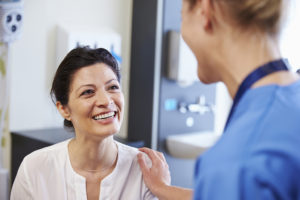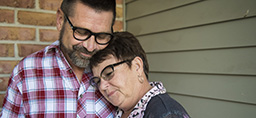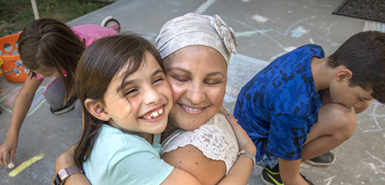
The number of women who are diagnosed with breast cancer each year is both staggering and sobering.
The sheer vastness of it continues to drive the need for better prevention and identification of women at risk for breast cancer.
The good news: We continue to offer better screening techniques and guidelines for the women who need to have early mammograms, ultrasounds and MRIs.
And as a result, more women will survive breast cancer than ever before. In many cases, they will be completely cured. At the very least, they will live with their cancer as a chronic disease that carries a small chance of being fatal.
In the world of medicine, we call this “cancer survivorship.”
With all the advances being made in breast cancer research, we have increased opportunities to improve cancer survivorship.
What does survivorship mean? It means supporting women and their families, friends and coworkers after a diagnosis of cancer to help these women adjust to their “new normal” and become as happy and healthy as possible.
The staff members at Spectrum Health’s Breast Cancer Survivorship offices are trained to help survivors after diagnosis and treatment.
An imperfect world
A woman I’ll call Betty had been referred to one of these offices by her breast cancer doctor.
Betty was a patient of mine and similar to many women I see in my office. She had been diagnosed with breast cancer two years after menopause, at age 54.
She had been taking low-dose menopause hormone therapy at her diagnosis, and she immediately stopped taking these pills along with all of her vitamins.
After being diagnosed with breast cancer, Betty had a tough year of surgery, reconstruction and chemotherapy. Although she was grateful for all of her Spectrum Health doctors and team members, she was even more grateful the year had ended.
Breast cancer rocked her world, but now that doctors considered her cancer free, she began to see all the positives that happened during her year of treatment.
Her family had become closer than ever and she realized which of her friends were most reliable during the tough times. Her faith had grown even stronger, too.
Before cancer, Betty’s marriage had been strong. It had now become more important to her, and she felt more connected to her husband.
Of course, everything wasn’t perfect in Betty’s new world.
She experienced hot flashes, night sweats, vaginal dryness, bladder urgency, low sex drive and weight gain.
Betty felt good about how she had been doing with her cancer treatment, but she felt the menopause symptoms held her back from living the life she wanted to live.
She came to my office in search of answers.
Hopes and goals
I started the visit by asking Betty to identify her most difficult issue. I also asked her to think about her goals for the future.
She became tearful as she told me how much she wanted to have sex without pain. She also wanted reassurance that she was doing everything she could to avoid having her cancer reoccur.
After that, we went through her list of menopause symptoms and looked at her daily habits.
Before cancer, Betty had been fairly active and consistent with her vitamins, but not necessarily consistent with exercise or eating a healthy diet.
She typically ate a meat-and-potatoes diet with limited colorful vegetables.
After cancer, she still ate the same comfort foods. She hadn’t resumed taking her vitamins and only recently had she begun to have enough energy to exercise. To help her stay awake, she would drink mostly iced tea and coffee—very little water.
Betty knew her habits weren’t very healthy, but she didn’t know where to start to get on a healthier track.
When I asked her about her past medical history, I learned she had given birth to large babies and had borderline sugar tests during her pregnancies.
She also had a hard time losing weight after her babies’ births. Her mom had diabetes and her dad had suffered an early heart attack.
On a positive note, Betty had not had any surgeries other than her bilateral mastectomy. She still has her uterus and ovaries, and she takes tamoxifen and tolerates it well, without any side effects.
When we finished talking, I did a physical exam on Betty, focusing on her bottom area, looking for menopause symptoms of the vagina and vulva.
My years of experience told me those were the likely sources of her pain during sex.
First I needed to rule out an infection or other skin conditions such as lichen sclerosis, which causes fissures in the skin in the vaginal area, causing bleeding and tears with sex.
My examination revealed Betty had low estrogen changes and bacterial vaginosis—an overgrowth of the wrong bacteria in the wrong place.
A urine sample also confirmed a bladder infection. No wonder she’d become so miserable!
Happier, healthier
It came time to help Betty formulate a plan to feel better and live a happier, healthier life.
We visited the Spectrum Health Breast Cancer Survivorship office to put it all together—her symptoms, her habits and her health history.
We couldn’t change Betty’s health history, but we could treat her symptoms and change her habits. Medicines could help with the infections. Sleep would prove essential in helping her lose weight and feel like having sex with her husband again.
Betty’s plan first included a short course of antibiotic cream to use in her vagina to treat the vaginal infection.
I also recommended a medicine called Lexapro, which is a Selective Serotonin Reuptake Inhibitor (SSRI), to help with her night sweats.
SSRIs increase available serotonin in the brain. Serotonin acts as the brain’s thermostat, helping to stop hot flashes and night sweats. This medicine is not for everyone, but I encouraged Betty not to be put off by the fact it is labeled as an antidepressant. I encouraged her to try it for several months.
Vaginal dryness, part of what is called the Genito-Urinary Syndrome of Menopause, is caused by low estrogen.
Betty’s cancer had been estrogen positive and she had been worried about taking vaginal estrogen. I explained that in low doses, vaginal estrogen cream, vaginal tablets, or Estring (estradiol vaginal ring) are all known to have little or no absorption in the blood. Also, they are not known to increase the risk of cancer recurrence.
I had worked with Betty’s oncologist, and we agreed on the data and considered it a good option for Betty.
When she left my office, Betty had three prescriptions to treat her medical symptoms.
I also gave her some healthy habits that were just as important in helping her achieve her goals of having pain-free sex, keeping her cancer from reoccurring and living a healthier lifestyle.
I explained the Seven Essential Elements of Daily Success, or SEEDS, and how they can help her menopause symptoms improve and keep infections away.
Planting SEEDS
I’ve talked about the SEEDS in many of my previous blogs because they are so important to good health.
Here’s what I shared with Betty about SEEDs and how they could help her:
- Drink plenty of water—eight glasses a day. Add one more for each cup of coffee or serving of alcohol.
- Get plenty of sleep—seven hours a night. Take power naps if necessary to ensure the sleep is adequate.
- Take vitamins daily, including Vitamin D and a multivitamin.
- Eat a balanced diet, including plenty of healthy carbs and protein, with only one sugar treat per day (including alcohol). No more corn and potatoes at dinner.
- Eat plenty of fiber (think vegetables) and take a fiber pill if needed. More fiber would help Betty’s bowels and limit the level of bad bacteria entering her system. I also suggested that Betty introduce more probiotics by adding Kombucha and kefir yogurt.
- Exercise regularly—30 minutes a day, with a mix of walking, aerobic activity, strength training and stretching.
- Start a gratitude journal and do metered breathing each night before bed.
Betty had new hope that her plan would help her reach her goals. With her year of treatment behind her, she had been wanting to really put it all behind her—and she finally felt like this would now be possible.
As a physician, my ultimate goal is to help women. I’m pleased each time I’m able to bring such useful information to women who have suffered not only breast cancer but also any other cancers that are treated with chemotherapy or radiation.
These therapies are life-saving, but they also induce menopause and cause midlife and menopause symptoms.
There is hope. We can ensure the “new normal” is a really good normal.
 /a>
/a>
 /a>
/a>
 /a>
/a>